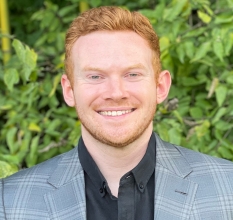
B.A., Lee University (Biblical and Theological Studies) 2016
M.A., Boston College (Philosophy) 2019
Ph.D., Boston College (Philosophy) 2024* (ABD)
Austin M. Williams specializes in German Idealism and Phenomenology. He joined the faculty of the Seminary in 2024 as Assistant Professor of Philosophical Theology. Before joining the seminary faculty, he served as a teaching fellow or adjunct faculty member in the departments of philosophy at Boston College, Assumption University, and Eastern University. He also spent several years (2017-2022) working with teenagers and young adults with disabilities (14-22) at the Ivy Street School (a residential educational and therapeutic program in Boston). Austin has taught a range of courses that include themes from ethics, political philosophy, philosophy of religion, metaphysics, and the history of philosophy. However, his research focuses primarily on the philosophy of psychology and philosophical theology as they developed in the 19th and 20th centuries.
While Austin’s methods of research are largely informed by contemporary European philosophy (especially phenomenology), his questions emerge out of ecclesial and therapeutic environments. Growing up the son, grandson, and great-grandson of Pentecostal ministers, at a young age he became acquainted with a living God interacting in sometimes dramatic ways with regular people. Thus, much of his research explores how we understand God’s role in religious experience. Working in an educational context where people struggled with any number of mental health challenges, a second set of questions emerged. Namely: why do people hurt themselves? And how can they recover? These two contexts and questions converge at what the theologian Walter Hollenweger identified as the heart of Pentecostal spirituality, namely meditation upon the blood and wounds of Christ.
Austin is passionate about equipping students and practitioners with the best resources afforded by contemporary philosophy, psychology, and theology to address the pressing questions in their lives and contexts. When not teaching, reading, or writing, he can typically be found hiking, watching football, or cooking with friends.
email: awilliams@ptseminary.edu